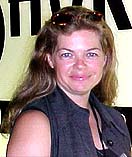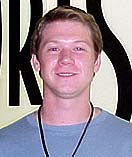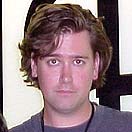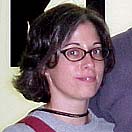|
|
 |
 |



- We asked the directors three questions.
|

|
Do you think that digital technologies will someday completely (100%) take the place of film?
|

|
Do you think that short film will establish itself as an entertainment genre?
|

|
Which Japanese directors do you like?
|






|

|

I think that "12 X 12" would not have worked if it hadn't been shot on film. With its limited budget, rather than using a computer, I wanted to use 35 millimeter film. Besides, as a cameraperson, I feel more comfortable shooting on film as opposed to digital, and can get better results from it.

Because there are already many short film fans, I think that it has definitely established itself as a genre. Especially for young people accustomed to MTV, who watch one five-minute piece after another. If this one is boring, they move onto the next-it's this kind of generation, you know?

Kurosawa Akira. He was filled with a painter's talent; didn't he also handle his own costumes, too? I really respect his artistic abilities. I also like Kitano Takeshi's Hanabi, Brother, and Kikujiro. Simple, yet with a sense of humor.

|
Maja was born in Switzerland, left her hometown when she was 26 to live in Paris for a year, and then left for Los Angeles when she was 27. On her reasons for leaving her hometown, Maja says, "Because Switzerland is a very small country, economics are really emphasized, and people don't really turn their interest toward things like the film industry or art. So in order to make films, I had no choice but to run off to another country. Besides, I also thought that I might be able to rediscover the good points of Switzerland if I left it and got to know another culture.
On the making of "12 X 12," she says that she received help from many friends who work in Hollywood. "Cockroaches played a very important role in this film, and I was lucky to find help from a cockroach specialist. A cockroach's movements actually change depending upon the temperature. So when he wanted to make the cockroaches run, he would warm them up with a hairdryer, and when he wanted to make them stop, he would cool them down with ice-in this way he was able to easily manipulate them. Only in Hollywood could you find this kind of specialist (laughs)." While she says that she doesn't like cockroaches, in order to make this film, she brought them back to her home and did such things as observe them for background and try to talk to them.
For five years, from the age of 16, and after studying photography, she traveled all over Europe for six years as a fashion photographer; she has a unique background. She said, "When I was taking pictures, I would do everything myself, from location scouting to setting up the lights, but film is all about team work. I liked working as a team better. Besides, a photo can only capture one moment, but a film has a beginning and an end, and you can even add music. I think that only if the challenge is big will your return also be big."

 |




|

|

Probably the frequency of computer graphics use is going to spread widely, but I think films are not going to disappear. But to capture the moment that exists "now" then there's probably not a better way than filming digitally. In addition to that, if you are going to manipulate it or use computer graphics then it is easier if it's in digital film and even t.v.'s are gradually changing into digital.

Short films are gaining in popularity now. Even, two or three years ago there weren't any film festivals like this one. What I am hoping now is that, like back in the 30's or 40's, theaters will start showing shorts before the feature films.

There is one, I am planning to buy and bring back one of his DVDs. Another would be Takeshi's "HANABI", and of course Kurosawa. Kurosawa is as much a director of the world as a director of Japan.

|
According to Mark Carter, his film was shot within 17 hours in one day. He took a good deal of time in editing, though; especially the throwing up scene which took him 45 hours of editing time.
But he spent the largest amount of time on casting. "Actors present the film, and if you fail in casting then it means that your film also ends in failure. The next most important element would be the script. I took care in constructing how and where I should bring in the climax."
The boy who played Roger Mead has quite a career in acting. Three years ago he appeared in the movie "Matilda," and he has also acted in many commercials. The young actor was cast after his audition, but Mark had experience working with him already on a commercial.
"I wanted to champion freedom of expression (laugh). I wanted to depict family pathology. Most people when they are kids rebel against their parents or feel like they want to express themselves. This idea is what I wanted to show."
Mark Carter never went to film school, but he learned on his own. During his high school years, he learned about tools and machinery but not about films. "Making films was always my dream. By chance, people around me also wanted to make films and so we decide to work together."
Lastly, are there any messages for any Japanese people who are planning to make films?
"I would advise people to have good relationships with others. Know what you like and what you don't. When you making films, you have to show your originality. There are so many films out there, so it can be difficult to make something that really lets your own creativity shine through and leave an impression. In order to do this make a habit of seeing and looking at things."

 |




|

|

I don't know if [filmmaking] will be 100% digital, but things will become more digital. All the film companies had better work hard (laughs). Even if there are film fans, there'll probably be fewer and fewer of them. (Dan)
I think that things will become this way soon, even though I may not be happy about it. Because I like everything about film, I'd be very sad about its disappearance. (Tiffany)

Of course. With a feature length film, the spectator's concentration level can be broken. Because of this, I think that filmmakers will increasingly lean in the direction of making short films. (Dan)
I feel the same way. (Tiffany)

Kurosawa Akira. But I've had very few opportunities to see Japanese films. Hong Kong films are often being shown, though. I also like the Japanese TV show, Iron Chef (laughs). (Dan)
I'd say Kurosawa Akira. (Tiffany)

|
Depicting a man who tattooed his entire body, this work strives for a documentary feel. This very impressive main character is actually played by Dan's friend. "He's my neighbor-it's already been 5 years since I first met him. When I was doing production work for commercials in Texas, he was also doing the same job. He's really an extremely interesting person. The story for this film was in the works for two years, and I had a hard time finding an actor who perfectly fit the part. But when I happened to look around at my surroundings, the perfect guy was right there." In the film, the protagonist gets tattoos to express his opposition to society. We asked Dan about the actual reason for his friend getting all those tattoos: "He just thought that tattoos looked good, and did it for his own satisfaction and pleasure." Actually, on his right arm in the scene shot in the vehicle are tattoos of things like geisha and carp-images with a Japanese flavor. Not only did he get tattoos with a Japanese design, but he also seems to have studied the Japanese history behind these images.
Tiffany, the director of photography for this film, studied at film school in Texas, where she learned to make movies beginning from the structure of the camera. On the difficulties they had in shooting this film, she said, "I concentrated on what the two actors were saying or doing, but tried hard not to interfere with it. They knew what they were going to do in advance, but I had to film not knowing what would happen next. Because we wanted to film with a documentary touch, we tried to express a kind of 'what will happen next' freshness."
This work was selected by the committee to receive the American Short Shorts Award. In the end, we asked Dan for his thoughts on receiving it: "I'm very pleased. To win a prize is a wonderful thing. I think that it's also an honor to receive the extra prize of 35 mm film. Because I want to shoot my next film on 16 mm black and white, I'll use it for the one after that."

 |
 |
 |
Copyright, (C) American Short Shorts Film Festival 2001. All rights reserved.
Feedback to assff2001@hotmail.com |
|
|